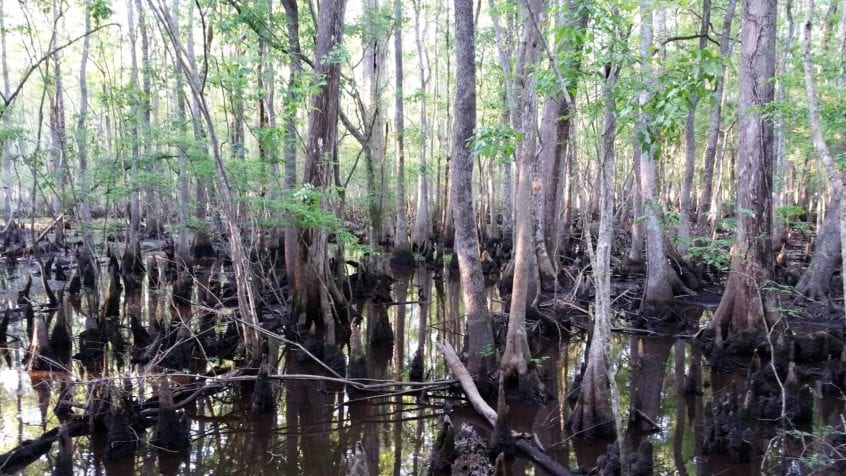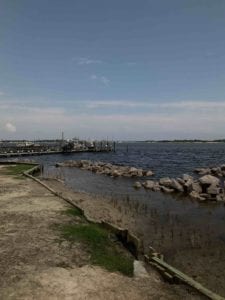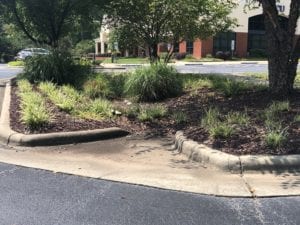
Nature-Based Solutions
When thinking about the process of nature conservation and maintenance, many people’s minds immediately think of industrialized solutions involving high-tech and expensive machinery and hardened structures. Still, the tools are already naturally provided and available. Nature-based solutions sustainably use natural resources to address issues such as water quality and quantity, climate change, biodiversity conservation and protection, water supply security, and community health. Nature-based solutions can be as simple as a prescribed burn of an area to encourage more growth and clear the groundcover or as extreme as nature conservation and protection of large blocks of land. Through the protection and rebuilding of natural areas, the amount of carbon in the atmosphere can effectively be lowered to slow the effects of climate change.
Wetlands are important in regulating water quantity through flood attenuation and help to provide cleaner, safer water to the habitat and community. Wetlands also offer a home to many different species, and in North Carolina, 70 percent of them are endangered, threatened, or of concern (1). Protecting wetlands will allow these plants, fish, and other wildlife to thrive and reestablish themselves.
Erosion and water contaminations are both consequences of heavy rain in deforested areas and urban environments due to impervious surfaces. Conserving wetlands provide protection to the soil and prevents soil erosion and landslides. Protecting riparian buffers and restoring the native plant communities along streams and rivers helps to protect the receiving waters. A way that some states have combatted erosion is through stream restoration, bioengineering streambanks, and riverbanks to stabilize the land on the bank as well as providing for instream habitat structures. The process involves using logs, rocks, and vegetation to rebuild and strengthen the soil around the stream or river.
 Coral reefs absorb and store large amounts of carbon, slow saltwater from intruding on crops and livestock, and provide a home to thousands of different species. Sadly, many reefs globally have been experiencing coral bleaching from the increased temperature of the ocean and are frequently destroyed by boat propellers. Rebuilding and protecting coral reefs from boating and overfishing can naturally reintroduce more biodiversity and will benefit the habitat around it.
Coral reefs absorb and store large amounts of carbon, slow saltwater from intruding on crops and livestock, and provide a home to thousands of different species. Sadly, many reefs globally have been experiencing coral bleaching from the increased temperature of the ocean and are frequently destroyed by boat propellers. Rebuilding and protecting coral reefs from boating and overfishing can naturally reintroduce more biodiversity and will benefit the habitat around it.
North Carolina and many other coastal states are the locations of coastal marshes and estuaries that provide areas for spawning and primary nursery area for many species of fish and are nesting and feeding areas for birds and other kinds of wildlife. Run-off from industrial hog farms pollutes the water with pesticides, waste, or other harmful toxins that affect the species attempting to breed and live there.  You can also help prevent harmful run-off by using fewer pesticides or alternative organic pesticides and limit the use of fertilizers on your lawn or plants. Protecting and keeping these important watershed areas clean helps to keep the oceans cleaner and encourage species to reproduce. The rain falling on you will, in one way or another, flow into the ocean.
You can also help prevent harmful run-off by using fewer pesticides or alternative organic pesticides and limit the use of fertilizers on your lawn or plants. Protecting and keeping these important watershed areas clean helps to keep the oceans cleaner and encourage species to reproduce. The rain falling on you will, in one way or another, flow into the ocean.
The most common and well-known nature-based solution is planting more trees to make up for what has been lost through deforestation. A recent study estimated that planting more trees could remove two-thirds of the carbon dioxide currently in the atmosphere (2), even without encroaching on urban areas or farmland. This type of Nature-based solution isn’t just left to companies trying to offset their carbon footprint, and you can help too! All it takes is a shovel, a tree, and some helping hands, and you’ve already made a difference.
The nature-based solution can seem intimidating because they are a bit longer term, and it may take some time to really see an effect, but these solutions aren’t just for big corporations. You can effect change by taking action in your habitat, whether it be by planting trees, allowing areas in your yard to become more natural with no mowing, refraining from the use of pesticides and herbicides, or donating to conservation groups.